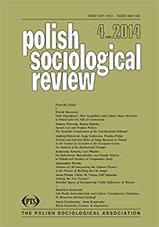Formal and Informal Rules of Doing Business in Poland in the Context of Accession to the European Union: An Analysis of the Institutional Changes
Formal and Informal Rules of Doing Business in Poland in the Context of Accession to the European Union: An Analysis of the Institutional Changes
Author(s): Andrzej Bukowski, Kaja Gadowska, Paulina PolakSubject(s): Social Sciences
Published by: Polskie Towarzystwo Socjologiczne
Keywords: new institutionalism; formal and informal institutions; Polish entrepreneurs; business law; public administration
Summary/Abstract: From the perspective of new institutionalism, this article studies the rules of doing business in Poland in the context of the country's accession to the European Union. The article's starting point is the premise that interaction between formal and informal institutions leads to an institutional balance or imbalance and determines the final shape of the economy and its effectiveness. Accordingly, the authors analyze four types of relations occurring between the formal and informal rules of doing business in Poland: (1) the influence of the restrictiveness of regulations on informal relations between the public administration and business; (2) the relation between the low effectiveness of the law in regards to running a business and informal adaptive reactions; (3) the effects of EUlaw on business strategies; (4) the effects of the global economy on the extent and forms of cooperation between the public administration and business. Analysis of empirical material provides a basis for constructing four institutional models of the rules of doing business in Poland: the 'antagonistic' model, in which the administration and business are striving for mutually exclusive goals; the 'parallel' model, where formal and informal institutions create separate orders; the 'alternative' model, in which formal, new, EU solutions are created; and the 'integrated' model, where actors are encouraged to realize common aims.
Journal: Polish Sociological Review
- Issue Year: 188/2014
- Issue No: 4
- Page Range: 475-508
- Page Count: 33
- Language: English

